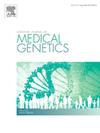Promoting reflective practice: Exploring access to supervision in European genetic counselling programmes
IF 1.7
4区 医学
Q3 GENETICS & HEREDITY
引用次数: 0
Abstract
Genetic Counselling Supervision (GCS) plays an integral role in professional development, stimulating reflective practice and helping to prevent burnout. Nevertheless, evidence points to insufficient practice of GCS. This study aimed to explore the current state of counselling supervision access during MSc training, along with barriers and facilitators for its implementation. MSc coordinators of the current EBMG accredited programmes were invited to participate in this study via email, with the request to fill out a questionnaire. The qualitative data obtained was reviewed using thematic analysis, while descriptive statistics was used for the quantitative data.
GCS was considered crucial for fostering professional development, safe practice, and emotional support for the future professionals.
While all MSc programmes included counselling supervision in their course curricula, its implementation was highly heterogeneous. Students have access to GCS during clinical placements in 62,5% of the programmes, facilitated by institutional support and EBMG guidelines. Several barriers hindered its broader implementation, as was the case of a shortage of senior genetic counsellors and the lack of professional recognition in some countries.
This study compiled evidence of the insufficient practice of GCS across Europe and its limited integration in MSc programmes. Therefore, we recommend educational pathways actively promote genetic counselling supervision routines to ensure graduates enter the workforce with the necessary tools to provide care with the expected standard of safety and quality, while maintaining a reflective practice.
促进反思性实践:探索欧洲遗传咨询课程中的监督途径。
遗传咨询监督(GCS)在专业发展中发挥着不可或缺的作用,刺激反思实践,帮助防止倦怠。然而,有证据表明GCS的实践不足。本研究旨在探讨硕士培训期间咨询监督准入的现状,以及其实施的障碍和促进因素。目前EBMG认证项目的理学硕士协调员被邀请通过电子邮件参与这项研究,并要求填写一份调查问卷。获得的定性数据使用专题分析进行审查,而定量数据则使用描述性统计。GCS被认为对促进专业发展、安全实践和为未来专业人士提供情感支持至关重要。尽管所有的理学硕士课程都在课程设置中包含了咨询监督,但其实施情况却参差不齐。在机构支持和EBMG指导方针的推动下,62.5%的课程的学生在临床实习期间可以获得GCS。一些障碍阻碍了其更广泛的实施,例如在一些国家缺乏高级遗传顾问和缺乏专业认可。这项研究收集了证据,证明GCS在整个欧洲的实践不足,以及它在硕士课程中的整合有限。因此,我们建议教育途径积极促进遗传咨询监督程序,以确保毕业生进入劳动力市场时拥有必要的工具,以提供预期的安全和质量标准的护理,同时保持反思实践。
本文章由计算机程序翻译,如有差异,请以英文原文为准。
求助全文
约1分钟内获得全文
求助全文
来源期刊
CiteScore
4.10
自引率
0.00%
发文量
193
审稿时长
66 days
期刊介绍:
The European Journal of Medical Genetics (EJMG) is a peer-reviewed journal that publishes articles in English on various aspects of human and medical genetics and of the genetics of experimental models.
Original clinical and experimental research articles, short clinical reports, review articles and letters to the editor are welcome on topics such as :
• Dysmorphology and syndrome delineation
• Molecular genetics and molecular cytogenetics of inherited disorders
• Clinical applications of genomics and nextgen sequencing technologies
• Syndromal cancer genetics
• Behavioral genetics
• Community genetics
• Fetal pathology and prenatal diagnosis
• Genetic counseling.

 求助内容:
求助内容: 应助结果提醒方式:
应助结果提醒方式:


